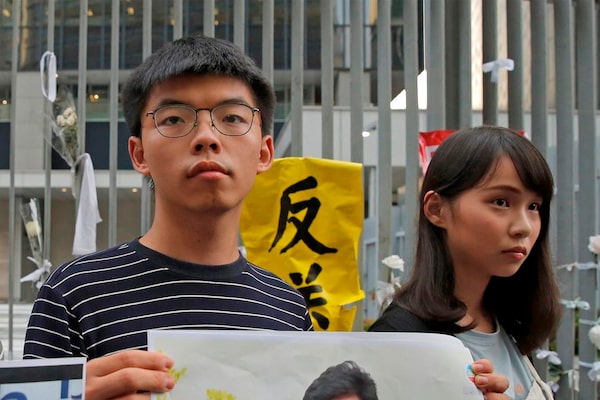
In this June 18, 2019, file photo, pro-democracy activists Agnes Chow, right, and Joshua Wong speak to the media outside government office in Hong Kong.The Associated Press
Police in Hong Kong have arrested at least three young leaders, including one of the city’s most prominent democratic activists, a day before a weekend of new protests are expected to begin.
The arrests mark a tightening in law enforcement in the Asian financial centre, where protests, some of them violent, have now continued for more than 80 days.
On Friday morning, officers arrested Joshua Wong and Agnes Chow, members of pro-democracy organization Demosisto. Mr. Wong is one of the most recognizable young leaders in the city. He was released from prison in mid-June, after serving a two-month sentence for his role in the 2014 Umbrella Movement in which protesters occupied city streets for 79 days.
On Thursday night, officers also arrested Andy Chan, an open supporter of independence for the city, which has been part of China since its handover from Britain in 1997. Mr. Chan, who lead the now-banned Hong Kong National Party, was detained at the airport as he attempted to board a flight, he wrote on Facebook. Police accuse him of rioting and assaulting an officer, after a summer of protests in which demonstrators have often clashed violently with riot police.
Mr. Wong was arrested on his way to a subway station. Ms. Chow was arrested at her home, Demosisto said. Mr. Wong is accused of inciting, organizing and taking part in an unauthorized assembly, while police allege Ms. Chow incited and took part in an unauthorized assembly, the South China Morning Post reported. Mr. Wong and Ms. Chow were later released on bail and had their cases adjourned until November.
“This is the beginning of a wider crackdown. From arresting people on the street to arresting people from their home,” said Avery Ng, an activist and former politician in Hong Kong.
Hong Kong Chief Executive Carrie Lam has not ruled out the use of an emergency ordinance that would grant her extraordinary powers to maintain public order, including the use of curfews or internet censorship. Such measures, however, are not imminent, Bernard Chan, a top adviser to Ms. Lam, told a conference organized by the South China Morning Post on Thursday.
But detaining leaders is “the correct thing to do, given the scale of the turmoil in Hong Kong,” said He Weiwen, a former Chinese diplomat who sits on the executive council of the China Society of WTO Studies and is a senior fellow at the Center for China and Globalization.
“It’s acceptable that people in Hong Kong express their will in a peaceful way. But now most people are expressing their voice with violence,” he said in an interview on Friday. Arrests do not mark a turning point, he said, but a continuation of Beijing’s long-held opposition to unrest and social disorder. “Hong Kong belongs to China, and the central government has the right to do whatever it feels necessary on its own territory.”
In Hong Kong, however, those who have opposed Beijing’s influence in the city said the arrests stood to galvanize protests, rather than subdue them.
“Yesterday’s attacks and today’s arrest will ignite further anger in the people and would only cause more people to come out this weekend, even without official authorization from police,” Mr. Ng said.
On Thursday, two organizers with Civil Human Rights Front said they had been attacked by masked men brandishing a baseball bat and knife. The group has planned three marches that have attracted, by its estimates, more than a million people.
Police have, however, opposed its attempts to organize another mass rally on Saturday, a day that marks five years since Beijing proposed a form of limited democratic elections for the city’s chief executive that would allow mainland authorities to maintain influence on who could run for the position, the most powerful in the territory. Open-nomination elections would create a “chaotic society,” a Beijing representative said at the time. The proposal was criticized as “fake democracy” and rejected by the Hong Kong Legislative Council.
Rallies organized by the Civil Human Rights Front have generally been peaceful.
“It boggles the mind as to why the government, which has talked about reconciliation and healing a divided society, would make this move only the day before another mass protest is planned,” said Jason Ng, convener of the Progressive Lawyers Group, whose members have frequently joined pro-democracy marches in recent months.
There is no evidence that the police acted improperly in their arrests on Thursday and Friday, he said.
But “the arrests of young activists have reopened old wounds and galvanized the city once more to take their grievances to the streets tomorrow.”
Beijing, however, has sent numerous signals that it regards violent protest as a national threat.
“One core message that Beijing officials have publicly repeated is that there can be no backing down in the face of forces creating unrest and posing threats. Another is that the central authorities will not sit back if things get out of control,” Mr. Chan, the adviser to Ms. Lam, wrote in a commentary posted on Friday morning in the South China Morning Post.
“If the situation continues to worsen and turns into major turmoil that threatens the basic safety of innocent people, Beijing will take military measures,” Mr. He added. “Such measures are grounded in the Basic Law” − the Hong Kong constitutional document.
“Hong Kong protesters should stop thinking that the Hong Kong issue is untouchable for Beijing,” he said. “It is not.”
Protesters have acknowledged that possibility, but have said they intend to battle on nonetheless.
“There are two main possible outcomes for Hong Kong,” Andy Chan, the man arrested on Thursday night, told The Globe and Mail in a mid-August interview. “One being China cracks down on Hong Kong people, sending in paramilitary police. The second one is that we throw out the government.”
 Nathan VanderKlippe
Nathan VanderKlippe